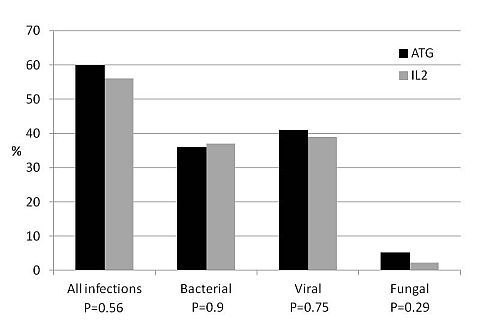Infectious Complications after Depleting or Non-Depleting Antibody Induction in Kidney Transplant Recipients over 60 Years of Age
The Methodist Hospital, Houston
Meeting: 2013 American Transplant Congress
Abstract number: C1350
Depleting antibodies have been associated with an increased infection risk after renal transplantation, particularly in older recipients. The purpose of this study is to examine this risk in a cohort of patients >60 years receiving common induction strategies. Consecutive kidney-only recipients >60 years of age and transplanted between 1/2007 and 10/2011 were reviewed for the development of infectious complications (IC). IC captured were: bacteremias, pneumonias, c. difficile, skin/soft tissue, urosepsis, pyelonephritis, viral infections, and systemic fungal infections. Patients receiving rituximab at the time of transplant were excluded. All patients underwent routine monitoring for CMV and BK by polymerase chain reaction post-transplant. A total of 75 patients received antithymocyte globulin (ATG) and 90 received IL2-antagonist (IL2) induction, and mean follow-up was 32 months. Differences in baseline characteristics included a greater percentage of African Americans (39% vs. 3%), deceased donors (77% vs. 54%), and females (41% vs. 20%) in the ATG vs. IL2 groups, respectively (p<0.05 for each). There were no differences with respect to age, body mass index, diabetes history, or high-risk CMV status. Mean mycophenolate dose was lower in the ATG group throughout much of the follow-up. Rejections occurred in 9.3% and 10% in ATG and IL2 groups. The incidence of infections did not differ by group (below), nor were there differences in any individual IC including bactermias (12 vs. 15%), CMV (27 vs. 21%) or BK (21 vs. 22%). Fungal infections occurred at twice the rate in the ATG group, although this did not reach significance. The number of infections per patient was also similar (1.5 vs. 1.2 in ATG and IL2; p=0.3). In conclusion, we found no differences in the rate of infections among a cohort of older kidney transplant patients receiving depleting vs. non-depleting induction.
| Month: | 1 | 6 | 12 | 18 | 24 |
| FK (ng/mL) | |||||
| ATG | 9.1 | 7.1 | 7.2 | 6.7 | 6.3 |
| IL2 | 9 | 7.2 | 7.1 | 7.8 | 6.4 |
| Mycophenolate (gram/day) | |||||
| ATG | 1.9 | 1.5¹ | 1.4¹ | 1.4 | 1.4¹ |
| IL2 | 2.0 | 1.7 | 1.6 | 1.6 | 1.7 |
| Prednisone (mg/day) | |||||
| ATG | 18.6 | 7.9 | 6.6 | 5.6 | 5.6 |
| IL2 | 20.1 | 8.3 | 7.3 | 6.6 | 7.1 |

To cite this abstract in AMA style:
Patel S, DeVos J, Dawson K, Knight R, Gaber A. Infectious Complications after Depleting or Non-Depleting Antibody Induction in Kidney Transplant Recipients over 60 Years of Age [abstract]. Am J Transplant. 2013; 13 (suppl 5). https://atcmeetingabstracts.com/abstract/infectious-complications-after-depleting-or-non-depleting-antibody-induction-in-kidney-transplant-recipients-over-60-years-of-age/. Accessed February 28, 2026.« Back to 2013 American Transplant Congress
